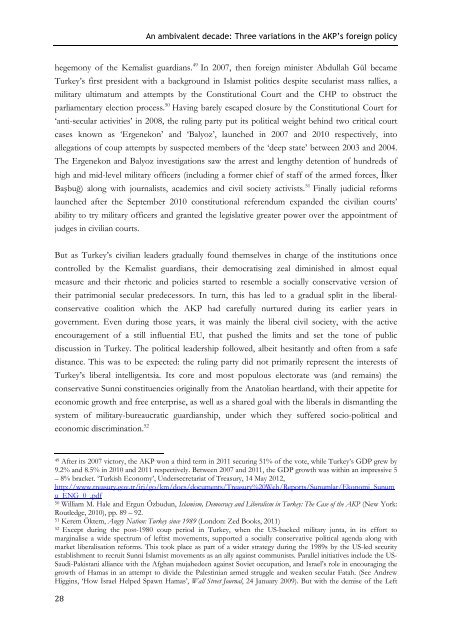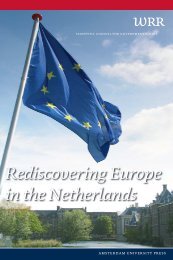The Western Condition - St Antony's College - University of Oxford
The Western Condition - St Antony's College - University of Oxford
The Western Condition - St Antony's College - University of Oxford
Create successful ePaper yourself
Turn your PDF publications into a flip-book with our unique Google optimized e-Paper software.
An ambivalent decade: Three variations in the AKP’s foreign policy<br />
hegemony <strong>of</strong> the Kemalist guardians. 49 In 2007, then foreign minister Abdullah Gül became<br />
Turkey’s first president with a background in Islamist politics despite secularist mass rallies, a<br />
military ultimatum and attempts by the Constitutional Court and the CHP to obstruct the<br />
parliamentary election process. 50 Having barely escaped closure by the Constitutional Court for<br />
‘anti-secular activities’ in 2008, the ruling party put its political weight behind two critical court<br />
cases known as ‘Ergenekon’ and ‘Balyoz’, launched in 2007 and 2010 respectively, into<br />
allegations <strong>of</strong> coup attempts by suspected members <strong>of</strong> the ‘deep state’ between 2003 and 2004.<br />
<strong>The</strong> Ergenekon and Balyoz investigations saw the arrest and lengthy detention <strong>of</strong> hundreds <strong>of</strong><br />
high and mid-level military <strong>of</strong>ficers (including a former chief <strong>of</strong> staff <strong>of</strong> the armed forces, İlker<br />
Başbuğ) along with journalists, academics and civil society activists. 51 Finally judicial reforms<br />
launched after the September 2010 constitutional referendum expanded the civilian courts’<br />
ability to try military <strong>of</strong>ficers and granted the legislative greater power over the appointment <strong>of</strong><br />
judges in civilian courts.<br />
But as Turkey’s civilian leaders gradually found themselves in charge <strong>of</strong> the institutions once<br />
controlled by the Kemalist guardians, their democratising zeal diminished in almost equal<br />
measure and their rhetoric and policies started to resemble a socially conservative version <strong>of</strong><br />
their patrimonial secular predecessors. In turn, this has led to a gradual split in the liberalconservative<br />
coalition which the AKP had carefully nurtured during its earlier years in<br />
government. Even during those years, it was mainly the liberal civil society, with the active<br />
encouragement <strong>of</strong> a still influential EU, that pushed the limits and set the tone <strong>of</strong> public<br />
discussion in Turkey. <strong>The</strong> political leadership followed, albeit hesitantly and <strong>of</strong>ten from a safe<br />
distance. This was to be expected: the ruling party did not primarily represent the interests <strong>of</strong><br />
Turkey’s liberal intelligentsia. Its core and most populous electorate was (and remains) the<br />
conservative Sunni constituencies originally from the Anatolian heartland, with their appetite for<br />
economic growth and free enterprise, as well as a shared goal with the liberals in dismantling the<br />
system <strong>of</strong> military-bureaucratic guardianship, under which they suffered socio-political and<br />
economic discrimination. 52<br />
49 After its 2007 victory, the AKP won a third term in 2011 securing 51% <strong>of</strong> the vote, while Turkey’s GDP grew by<br />
9.2% and 8.5% in 2010 and 2011 respectively. Between 2007 and 2011, the GDP growth was within an impressive 5<br />
– 8% bracket. ‘Turkish Economy’, Undersecretariat <strong>of</strong> Treasury, 14 May 2012,<br />
http://www.treasury.gov.tr/irj/go/km/docs/documents/Treasury%20Web/Reports/Sunumlar/Ekonomi_Sunum<br />
u_ENG_0_.pdf<br />
50 William M. Hale and Ergun Özbudun, Islamism, Democracy and Liberalism in Turkey: <strong>The</strong> Case <strong>of</strong> the AKP (New York:<br />
Routledge, 2010), pp. 89 – 92.<br />
51 Kerem Öktem, Angry Nation: Turkey since 1989 (London: Zed Books, 2011)<br />
52 Except during the post-1980 coup period in Turkey, when the US-backed military junta, in its effort to<br />
marginalise a wide spectrum <strong>of</strong> leftist movements, supported a socially conservative political agenda along with<br />
market liberalisation reforms. This took place as part <strong>of</strong> a wider strategy during the 1989s by the US-led security<br />
establishment to recruit Sunni Islamist movements as an ally against communists. Parallel initiatives include the US-<br />
Saudi-Pakistani alliance with the Afghan mujahedeen against Soviet occupation, and Israel’s role in encouraging the<br />
growth <strong>of</strong> Hamas in an attempt to divide the Palestinian armed struggle and weaken secular Fatah. (See Andrew<br />
Higgins, ‘How Israel Helped Spawn Hamas’, Wall <strong>St</strong>reet Journal, 24 January 2009). But with the demise <strong>of</strong> the Left<br />
28

















